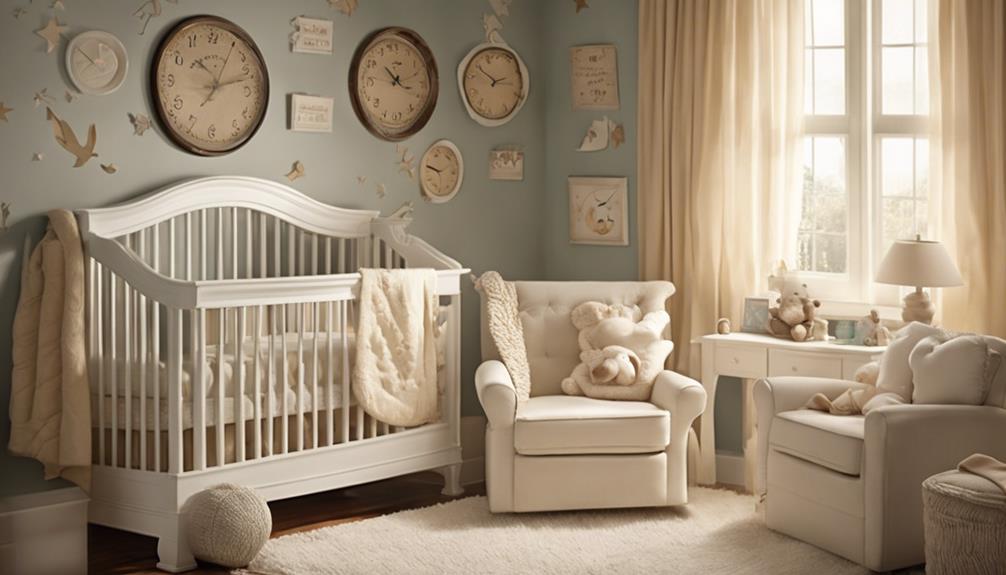Curious about how to help your newborn sleep soundly? In the world of parenting, ensuring your little one gets the rest they need can feel like a never-ending mystery.
But fear not, as we've compiled a list of top 10 tips that could be the key to unraveling those peaceful nights you've been dreaming of.
Let's explore these strategies together and discover how they might just be the missing pieces to your newborn's sleep success.
Key Takeaways
- Establish a consistent bedtime routine for signal sleep time and security.
- Create a calm sleep environment with dim lights and white noise.
- Swaddle your baby for comfort, safety, and longer sleep.
- Recognize sleep cues, share duties, support each other, and be patient in sleep training.

Dreamegg Portable Noise Machine for Baby Adult, Features Powerful Battery, 21 Soothing Sound, Noise Canceling for Office & Sleeping, Sound Therapy for Home, Travel, Registry Gift, Classic White
【COMPACT BUT POWERFUL】- D11 Max has more skills. Designed for all things sleep, this sound machine comes with…
As an affiliate, we earn on qualifying purchases.
As an affiliate, we earn on qualifying purchases.
Establish a Bedtime Routine
To help your newborn ease into a peaceful night's sleep, establishing a consistent bedtime routine is key. A bedtime routine signals to your baby that it's time to wind down and prepare for sleep.
Incorporating calming activities like a warm bath or a gentle bedtime story can help set the tone for relaxation. Starting the routine at the same time each night not only promotes consistency but also creates predictability for your little one, helping them feel secure and ready for rest.

JolyWell Night Light for Kids, Baby Night Light with 7 Colors Changing Mode & Stepless Dimming, Nursery Night Light BPA Free,Rechargeable Egg Night Light for Breastfeeding 1h Timer & Touch Control
Adorable Nursery Light for Breastfeeding:Night light is an essential item for your nursery.Touch feature makes it simple to…
As an affiliate, we earn on qualifying purchases.
As an affiliate, we earn on qualifying purchases.
Create a Calm Sleep Environment

Let's talk about setting the right mood for your little one's sleep.
Dimming the lights and using white noise can help create a calming atmosphere that signals bedtime is near.
These simple adjustments can provide the soothing environment your newborn needs for a restful night's sleep.
Dim Lights
Creating a softly lit sleep environment for your baby can greatly enhance their ability to wind down and enjoy a peaceful night's rest. Dim lights indicate to your newborn that it's time to relax, helping them shift into sleep mode. By regulating melatonin production, soft lighting supports your baby's natural sleep-wake cycle, promoting better sleep quality.
Low light levels reduce visual stimulation, making it easier for your little one to relax and drift off to sleep. Dimming the lights before bedtime can prevent overstimulation, creating a soothing atmosphere that encourages restful sleep. Embracing a dimly lit sleep environment not only aids in calming your baby but also improves the duration and quality of their sleep.
White Noise
Introducing white noise into your baby's sleep routine can create a calming environment that promotes restful and uninterrupted sleep. White noise helps mask environmental sounds that may disturb a baby's sleep and mimics the sounds heard in the womb, providing comfort and familiarity to newborns. It can promote deeper and more restful sleep by blocking out sudden noises, helping to establish a sleep routine and signal bedtime to your baby. Portable white noise machines are convenient for creating a soothing sleep environment at home or on the go.
- White noise helps mask environmental sounds.
- It mimics sounds heard in the womb.
- Promotes deeper and more restful sleep.
- Establishes a sleep routine.
- Portable white noise machines are convenient.

Muslin Swaddle Blankets for Newborn, 3 Pack Breathable Soft Receiving Blanket, Large 38 x 40 inches Swaddle Wrap Burping Clothes, Essentials Infant Shower Items, Toddler Gift (Bright Colors)
SUPER SOFT TO BABY’S SKIN: It is made of safe, natural and pure muslin 100% organic cotton cloth…
As an affiliate, we earn on qualifying purchases.
As an affiliate, we earn on qualifying purchases.
Swaddle Your Baby

Swaddling your newborn is an important technique that can contribute to their feeling of security and promote better sleep patterns. When you swaddle your baby, you're creating a cozy environment that mimics the snugness of the womb, helping them feel comforted and secure.
This practice not only prevents the startle reflex, allowing for longer and more restful sleep, but it can also aid in reducing the risk of Sudden Infant Death Syndrome (SIDS). Additionally, swaddling helps regulate your baby's body temperature, keeping them warm and preventing any unnecessary scratching of their face.

Johnson's Baby Sleepy Time Gift Set with Calming Bedtime Bath Wash, Lotion & Shampoo, Baby Bedtime Essentials with Relaxing NaturalCalm Aromas, Hypoallergenic & Paraben-Free, 3 Items
RELAXING BABY GIFT SET: From the WORLD’S #1 BABY & CHILD CARE BRAND*, Johnson's Sleepy Time Gift Set…
As an affiliate, we earn on qualifying purchases.
As an affiliate, we earn on qualifying purchases.
Monitor Room Temperature

Let's make sure we're using a reliable room thermometer to keep track of the temperature accurately.
It's crucial to adjust the room temperature as needed to maintain that best range for our little one's sleep comfort.
Consistency and attention to this detail can go a long way in promoting a peaceful and restful sleep environment for our newborn.
Use Thermometer for Accuracy
To guarantee your newborn's sleep environment is ideal, utilize a thermometer for accurately monitoring the room temperature. Maintaining the right room temperature is essential for your baby's comfort and quality of sleep. Here are some tips to help you achieve the perfect sleep environment:
- Set the thermometer in the nursery at a distance from heaters or windows.
- Make sure the room temperature remains between 68-72°F for the best sleep conditions.
- Regularly check and adjust the thermostat as needed to avoid extreme temperatures.
- Use a digital thermometer for precise readings and easy monitoring.
- Remember, a comfortable room temperature promotes better sleep quality for your little one.
Adjust as Needed
Monitoring the room temperature closely is important for ensuring your newborn's comfort and quality of sleep. When your baby is sleeping, laying them in an environment with a room temperature between 68-72°F is ideal. Use a room thermometer to keep track and adjust as needed to maintain this range.
Overheating or chilling can disrupt your baby's sleep, so it's important to regulate the room temperature accordingly. Check your baby's clothing layers regularly and make adjustments based on the room temperature to prevent any discomfort during sleep.
Consistently monitoring and adjusting the room temperature will help create a comfortable and safe sleep environment for your newborn.
Recognize Sleep Cues

Recognizing sleep cues in newborns is essential for promoting healthy sleeping habits and preventing overtiredness. As new parents, understanding these subtle signs can make a significant difference in helping your baby fall asleep more easily and improve their overall sleep quality.
Here are some key sleep cues to watch for in your little one:
- Look for yawning, rubbing eyes, and decreased activity as signs of tiredness.
- Crying, fussiness, and arching back can indicate overtiredness in babies.
- Observing decreased alertness, less eye contact, and decreased motor activity are cues for sleep readiness.
- Pay attention to slower movements, less vocalization, and decreased interest in surroundings as signals for sleep.
- Recognize early sleepy cues to prevent overtiredness and promote better sleep quality in newborns.
Be Flexible With Nap Times

Understanding the varying nap needs of newborns is important for parents to be flexible with nap times and promote better sleep quality for their little ones.
Babies can be unpredictable when it comes to napping, so it's critical to watch for tired cues like yawning or eye rubbing to catch the right window for a nap. By being attuned to these signals, you can help your baby settle down for a restful nap at the best time.
It's also beneficial to allow your baby to nap in different locations, whether in a stroller or baby carrier, to introduce flexibility into their sleep routine. This adaptability can prevent your baby from becoming overtired, leading to improved sleep quality overall.
Consider keeping a nap log to monitor your baby's sleep patterns, enabling you to adjust nap times accordingly and establish a more structured sleep routine for your little one.
Share Nighttime Duties

Let's talk about how dividing nighttime responsibilities with your partner or support person can make a world of difference.
By alternating sleep shifts and supporting each other, you can both get the rest you need to navigate those challenging newborn nights.
Creating a schedule and communicating effectively can help maintain consistency and strengthen your bond as caregivers.
Divide Nighttime Responsibilities
To establish a harmonious balance and secure high-quality care for your newborn, consider dividing nighttime responsibilities with your partner. Sharing the night duties not only helps prevent exhaustion but also promotes a more balanced approach to caring for your little one.
Here are some tips for dividing nighttime tasks effectively:
- Rotate who gets up for nighttime feedings
- Take turns soothing the baby back to sleep
- Share diaper changing duties
- Split the responsibility of putting the baby to bed
- Communicate openly about your needs and feelings
Alternate Sleep Shifts
Dividing nighttime responsibilities can greatly benefit both parents, especially when considering alternating sleep shifts to share nighttime duties effectively. Sleep deprivation is a common challenge for new parents, and by taking turns to care for the baby during the night, each parent can enjoy uninterrupted blocks of sleep, promoting better rest and mental well-being.
This approach not only helps in managing fatigue but also in distributing caregiving responsibilities evenly. By rotating nighttime duties, parents can foster teamwork and support each other in caring for the newborn, leading to a more balanced and sustainable sleep schedule.
Support Each Other
Working together to share nighttime duties can greatly reduce parental exhaustion and create a more balanced approach to caring for your newborn. Ensuring to support each other during this challenging newborn phase. Here are some tips to help you navigate nighttime duties as a team:
- Alternate responsibilities to ensure both parents get adequate rest.
- Collaborate on nighttime care to strengthen your sense of teamwork.
- Taking turns with nighttime duties can prevent burnout and enhance the parenting experience.
- Supporting each other fosters better communication and a more resilient partnership.
- Sharing nighttime duties creates a supportive environment for both parents.
Consider Pacifier Use

When considering pacifier use for newborns, ensuring the selection of a proper fit and safe design is essential to promote healthy sleep habits and reduce the risk of Sudden Infant Death Syndrome (SIDS).
Introducing a pacifier at the right time can be a game-changer in helping your baby fall asleep peacefully. Pacifiers provide a soothing mechanism that can assist in calming your baby to sleep by satisfying their natural sucking reflex. This not only promotes relaxation but also aids in self-soothing, potentially extending sleep durations for both you and your little one.
Choosing a pacifier designed specifically for newborns is critical to make sure safety and comfort. The right pacifier can help reduce the risk of SIDS during naps and bedtime while providing additional comfort once breastfeeding is established.
Stay Consistent With Routine

To guarantee your newborn's sleep success, maintaining a consistent routine is key in establishing healthy sleep patterns and promoting better rest. As parents, we recognize the importance of creating a predictable environment for our little ones to thrive.
Here are some practical tips to help you stay consistent with your baby's routine:
- Set a fixed bedtime: Establishing a regular bedtime helps signal to your baby that it's time to sleep, aiding in better sleep habits.
- Follow a bedtime ritual: Consistent bedtime routines, like a warm bath or gentle lullaby, can soothe and calm your newborn before sleep.
- Regulate wake-up times: Maintaining a consistent wake-up time can help set your baby's internal clock for more restful nights.
- Create a cozy sleep environment: Make sure your baby's sleep space is comfortable and conducive to sleep for a sense of security and comfort.
- Stick to the routine: Be persistent in following the routine to help your baby get the healthy sleep they need for optimal development and well-being.
Practice Patience and Persistence

Embarking on the journey of establishing healthy sleep habits for your newborn requires a blend of patience and persistence. It's crucial to understand that sleeping patterns don't develop overnight; they take time and consistency. As parents, we try various strategies, but sometimes it may feel like we fall back a step. This is where patience comes in – be patient with your baby as they adapt to new routines. Persistence is the key to success in this journey. It's vital for babies to have good and bad nights; however, staying committed to the process is crucial. Remember, every baby is unique, so what works for one may not work for another. Trust the process, make adjustments as needed, and your baby will gradually become more accustomed to a healthy sleep schedule.
| Tip | Description | Effect |
|---|---|---|
| Consistency is Key | Stay consistent with bedtime routines | Establishes routine |
| Comfort is Essential | Ensure your baby is comfortable before bedtime | Promotes relaxation |
| Patience is a Virtue | Be patient during the process of sleep training | Encourages progress |
Conclusion
To sum up, by incorporating these top 10 tips for newborn sleep success, you can create a peaceful and restful environment for your little one.
Remember, consistency is key, and with patience and persistence, you can help your baby develop healthy sleep habits.
So go ahead and give these tips a try – you'll be amazed at the difference they can make in your baby's sleep quality!









